
If you would like information and guidance about preparing and writing a LIFE+ proposal then this session is for you! Be quick to book though as registration closes on Tuesday 26th April. Further information can be found on our Events page.
Latest research and knowledge exchange news at Bournemouth University

If you would like information and guidance about preparing and writing a LIFE+ proposal then this session is for you! Be quick to book though as registration closes on Tuesday 26th April. Further information can be found on our Events page.
Aimed at all BU Academics (other colleagues welcome), this is a great opportunity to engage with a topic which crosses academic disciplines and to meet colleagues from across the University.
The theme of these events is the role of universities in building social capital, whether at regional, national or international level. By ‘social capital’ we mean the resources in a society which underpin social cohesion and inclusiveness. More cohesive societies with high social capital are likely to be more economically successful as well as politically stable.
Universities are or should be key institutions in enabling the growth of social capital, for example by generating and testing ideas for its enhancement, monitoring and supporting activities intended to increase it, and analysing examples of its decline or growth. Some of this will happen as a direct consequence of their educational missions and of research dissemination. However, much more could be achieved by universities through deliberate and strategic initiatives to engage with external communities.
A number of leading academics will be visiting BU to share their knowledge and expertise in this area:
See the Blog events calendar for details. For booking or information, please email Staff Development.
 The ESRC has announced that the next Knowledge Exchange call will go live on the 26 April 2011 will will be open until the 14 June 2011.
The ESRC has announced that the next Knowledge Exchange call will go live on the 26 April 2011 will will be open until the 14 June 2011.
There will be two schemes – the Follow on Fund scheme and the new Knowledge Exchange Opportunities scheme which is an amalgamation of all of the previous KE scheme, i.e. placements and KE small grants. The new scheme allows applicants to apply for a number of activities in one proposal, up to £100k, and it is hoped this will encourage applicants to think creatively about KE/impact and the best mechanisms for achieving these. The scheme is intended as a complement to the Pathways to Impact.
The call is aimed at social science researchers at all stages of their career and at organisations in the business, public and civil society sectors, with the intention of encouraging dialogue and collaboration between these groups.
Knowledge Exchange Opportunities Scheme
This is a new flexible scheme that provides funding for knowledge exchange activities at all stages of the research life-cycle and is intended as a complement to Pathways to Impact.
The scheme provides the opportunity to apply for funding for knowledge exchange activities at any stage of the research lifecycle, and is aimed at maximising the impact of social science research outside academia. The scheme replaces the ESRC Placement Fellowships (all sectors) and Knowledge Exchange Small Grants schemes.
The flexibility built into the scheme is intended to encourage applicants to think creatively about knowledge exchange, and applications are welcomed for either a single activity or a combination of activities; be it setting up a network to help inform the development of a research proposal, arranging an academic placement with a voluntary or business organisation, or developing tools such as podcasts and videos aimed at communicating the results of research to non-academic audiences. Some examples of knowledge exchange activities can be found below.
The Follow on Fund Scheme
The aim of this scheme is to provide funding for additional knowledge exchange and impact generating activities to follow on from a specific piece of substantial research that is drawing to an end or has recently finished.
This scheme provides the same flexibility as the Knowledge Exchange Opportunities scheme, and applications for either a single activity, or a combination of activities are welcomed. Follow on funding should be thought of as an extension and complement to the Pathways to Impact section of a research grant. Applicants are encouraged to think creatively about the format of the knowledge exchange, and to involve research users from the earliest stages of developing the proposal.
Further information is available from the ESRC website: http://www.esrc.ac.uk/funding-and-guidance/collaboration/knowledge-exchange/opportunities/index.aspx
If you are interested in applying to one of these schemes, please contact CRE Operations who will happy to support your application.
![]()
Environmental Technology Roadmap Initiative
Friday 13 May, 9am-4pm, Viridor Room, SS Great Britain, Bristol
What is a Technology Roadmap?
Who should attend?
Businesses who want to develop new products, processes, technologies or expertise in the following sectors:
Why should I attend?
Participate in collaborative Research and Development projects in the UK and Europe (possible funding)
This is a fantastic opportunity to be part of an ongoing business community where businesses can influence the universities and wider knowledge base on the technology required to drive the environmental industry forward.
Places are limited for this event, so register early to ensure your place by clicking here
Health: Survey Finds European Citizens Support European Work on Rare Diseases
This Spring, on the 4th World Rare Diseases Day, a Eurobarometer survey was published showing wide support for action on rare diseases at EU level.
FP7 Health: Registration Now Open for Information Day
Registration has been opened for the Open Information Day and Partnering Event which the European Commission is organising on the 2012 Work Programme for the Health Theme in FP7. The Information Day will take place on 9 June and is aimed at researchers interested in applying to the 2012 Work Programme. It will consist of plenary sessions and several parallel sessions on participation issues, such as a targeted session on international co-operation and one on clinical trials.
Health and ICT Policy: E-Health Action Plan Consultation
The European Commission has opened a public consultation on the eHealth Action Plan 2012-2020.
The proposed eHealth Action Plan is due to run in parallel to the Digital Agenda for Europe and the Innovation Union flagship initiatives under the Europe 2020 strategy. It will also support the objectives of the European Innovation Partnership on Active and Healthy Ageing.
Not yet signed up for UKRO alerts? See our former blog-post on how to do this
 EIT: Consultation Launched on the Strategic Innovation Agenda
EIT: Consultation Launched on the Strategic Innovation Agenda
The European Commission has launched a public consultation on the forthcoming Strategic Innovation Agenda (SIA) of the European Institute of Innovation and Technology (EIT), which is due to be published by the end of 2011. The consultation is open until 30 June 2011.
Innovation Policy: Proposals for Patent Protection to Boost Research and Innovation in Europe
The EC has unveiled two legislative proposals designed to reduce the costs of patents in Europe by up to 80%. The legislation is intended to enable any company or individual to protect their intellectual property through a single European patent, recognised in 25 EU Member States, and which thereby simplifies and reduces the costs of innovation. The draft proposals now pass to the European Parliament and Council of Ministers, where they require approval before they can enter into force as legislation.
FP8 Policy: LERU Event on Frontier Research
The League of European Research Universities (LERU) recently held an event in Brussels on “Frontier Research for Innovation”. The event included a keynote speech from Máire Geoghegan-Quinn, the European Commissioner for Research, Innovation and Science, followed by a panel discussion on the future of European research and innovation funding, in particular frontier and basic research. The panel included Maria Da Graça Carvalho, the rapporteur for the European Parliament’s ITRE Committee (on Industry, Research and Energy) report on the simplification of the Framework Programme. Points supported by panel members included that excellence should remain the criterion for selecting Framework Programme projects, whilst structural funds should be used to build excellence.
Not yet signed up for UKRO alerts? See our former blogpost on how to do this.
 EU Economy-Wide Climate Change Mitigation Modelling Capacity
EU Economy-Wide Climate Change Mitigation Modelling Capacity
The European Commission, Directorate-General for Climate Action, has published a call for tenders for the development and application of EU economy-wide climate change mitigation modelling capacity (all greenhouse gas emissions and removals).
Re-Evaluation of Food Additives Permitted in the European Union
The European Food Safety Authority (EFSA) has published a call for tenders for the provision of draft preparatory documents, including toxicological and non-toxicological data, to support the preparatory work for the re-evaluation of food additives permitted in the European Union.
The aim is to draw up a list of framework contractors who will be invited to enter specific competitions in the future which will entail drafting preparatory documents, including toxicological and non-toxicological data, to support the preparatory work for the re-evaluation of food additives permitted in the European Union.
Quantitative Estimates of the Demand for Cloud Computing in Europe
The European Commission, Information Society and Media DG, has published a call for tenders for the provision of quantitative estimates of the demand for cloud computing in Europe and the likely barriers to take-up.
The aim of this call for tender is to provide a quantitative assessment of the sectors which are potentially the most likely to adopt cloud computing and a qualitative assessment of the factors they are likely to perceive as the most significant policy or technical barriers.
Not yet signed up for UKRO alerts? See our former blog-post on how to do this.
![]() As a social networking tool, Facebook provides an interface for groups of people to to meet one another, communicate, store details about each other, and publish information about themselves in the form of a profile.
As a social networking tool, Facebook provides an interface for groups of people to to meet one another, communicate, store details about each other, and publish information about themselves in the form of a profile.
Facebook can be used as an academic collaboration tool for:
Facebook has been set up to suggest to users links and people they may know or be interested in, based on their interests, common goals, friends, etc. It is these serendipitous connections that help Facebook bridge the gap from social networking tool to academic collaboration tool.
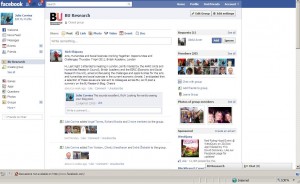 BU has recently set up the BU Research Group as a private Facebook group. This is a closed group that only members of BU staff can join. As such this provides a collaborative e-working environment for BU staff to:
BU has recently set up the BU Research Group as a private Facebook group. This is a closed group that only members of BU staff can join. As such this provides a collaborative e-working environment for BU staff to:
1. discuss research ideas safe in the knowledge that all discussions will only be visible by other group members, i.e. BU staff only
2. make contact with one another, to search for one another, to identify colleagues with particular skill sets, etc.
You can also use Facebook to set up your own private collaborative work space for themed discussions (for example to discuss ideas for a multidisciplinary bid) – you can select who to invite (this could be anyone, providing they have a Facebook account) and only those who are members of the group will be able to access the shared information.
Setting up a private group is really easy, you just need to:
A number of guides have been published about how researchers can use social networking tools to collaborate. The best two we are aware of are:
 Social Media: A guide for researchers, published by the Research Information Network in February 2011
Social Media: A guide for researchers, published by the Research Information Network in February 2011
Collaboration Tools, published by Educause Learning Initiative in August 2008
![]() Google Docs is an online tool that enables collaborators to work in a synchronous environment on a single document. Rather than passing a document between authors, Google Docs allows authors at different physical locations to work together on the same document in real time. Changes made to the document can be tracked and attributed.
Google Docs is an online tool that enables collaborators to work in a synchronous environment on a single document. Rather than passing a document between authors, Google Docs allows authors at different physical locations to work together on the same document in real time. Changes made to the document can be tracked and attributed.
So what does this actually mean? What does Google Docs do? There a is a rather nice explanation of this on the Google Docs Help site:
“Google Docs enables multiple people in different locations to collaborate simultaneously on the same doc from any computer with Internet access. For example, Alice and Meredith are working on a project together, and they need to write a document, keep track of their work in a spreadsheet, and create a presentation and a drawing to share with other people involved in the project. Alice lives in New York, and Meredith, in Los Angeles. When Alice makes changes to the document, spreadsheet, presentation, or drawing, Meredith can see them in real time and respond to them immediately. Both of them work on the same docs, so there’s no need to go back and forth, comparing and consolidating individual files.” (Source page)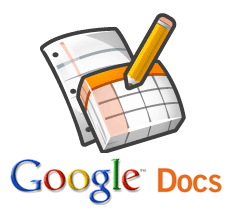
Sounds fabulous! And with Google Docs you can create documents, spreadsheets, presentations, etc. You can start a document in Office and then transfer it to Google Docs for collaborative editing. In addition, documents are saved to the cloud meaning that you can access them from anywhere with an Internet connection – no more faffing about with saving documents to pen drives or emailing documents!
Google Docs is free to sign up to; access is via a Google account.
You can keep up to date with enhancements to Google Docs via their blog.
If you’re already using Google Docs then let us know by commenting on this post!
Collaboration Tools for Academics (CTA) is one of the projects currently running at BU, sponsored by Prof Matthew Bennett. Steve Webster is the Business Analyst (EITS) working on the project and he has provided a project update. There is still the opportunity to run a fact finding workshop in your Research Centre, Academic Group and/or School so you can shape how collaboration tools are used and supported at BU in future.
The aim of the project is to facilitate collaborative working within and beyond BU and therefore raising the research-enterprise profile of the organisation. This will be achieved by making it easier for academic staff to work in a collaborative manner. In order to do this, the project will first identify what you currently do as a collaborative researcher and a member of academic staff and also identify where you feel the need for support in these activities.
There is an ongoing fact finding exercise that is trying to develop understanding in two areas. First there is an effort being made to understand people’s experience levels both in collaboration and in I.T. This is to ensure that all members of the community have their needs understood. Second there is an effort to understand the research activities that all members of the community are involved in.
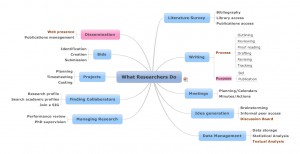 This mind map (click on the image to make it larger) has been used to generate discussion in a series of workshops. If your research group would like to run a packaged version of this workshop please contact the business analyst Steve Webster who will be pleased to help you set things up.
This mind map (click on the image to make it larger) has been used to generate discussion in a series of workshops. If your research group would like to run a packaged version of this workshop please contact the business analyst Steve Webster who will be pleased to help you set things up.
The final aim of the project will be to make visible and available a set useful services that you can use in support of you collaborative work. The services that get put into this set are not yet agreed. The kinds of things that you might like to have easy access to could include: blogs, wikis, voice and video conferencing, shared social space, installing novel software, survey software, data analysis tools. But these are all just examples. You still have an opportunity to get involved and contribute to shaping the future support offerings for researchers in BU and beyond.
Do you use collaboration tools to work with colleagues at the moment? If so let us know what works and what doesn’t work so well by commenting on this post!
 The Missenden Centre is running a series of workshops this year that may be of interest to BU academics and research support staff:
The Missenden Centre is running a series of workshops this year that may be of interest to BU academics and research support staff:
Successful Bidding: Day Clinic – 2 June 2011, London
Bidding for Research Funding for academic staff – 15/16 June 2011, Missenden Centre
Bidding for Research Funding for research support staff – 16/17 June 2011, Missenden Centre
The Missenden Centre courses are highly praised and well respected within the sector.
 BU will be holding a two day Research Excellence Framework (REF) event on 19 and 20 May to which all staff are invited to attend.
BU will be holding a two day Research Excellence Framework (REF) event on 19 and 20 May to which all staff are invited to attend.
Day 1 (open to BU staff and external delegates)
9am-2pm – this will be an external event supported by HEFCE to which all HEIs in the South of England will be invited. The focus will be on developing and assessing impact for the REF. There  will be speakers from HEFCE, an academic from one of the impact pilot institutions (University of Plymouth), and some of the impact pilot panel members. The event is aimed primarily at academics likely to be submitted to the REF and UOA Leaders. It will provide a forum for networking and discussion around preparations for the impact element of the REF.
will be speakers from HEFCE, an academic from one of the impact pilot institutions (University of Plymouth), and some of the impact pilot panel members. The event is aimed primarily at academics likely to be submitted to the REF and UOA Leaders. It will provide a forum for networking and discussion around preparations for the impact element of the REF.
Day 1 (open to BU staff only)
2pm-5pm – There will be an opportunity for internal networking, a demonstration of the publications management system BU will soon be implementing, and a talk by Prof Matthew Bennett on building a publication profile for the REF.
Day 2 (open to BU staff only)
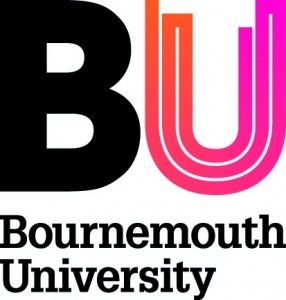 9am-4:30pm – the focus of Day 2 is the development of the BU impact case studies. The day will open with a presentation by Prof Matthew Bennett on what impact actually is, followed by presentations of the impact case studies being developed at the moment (3 per Unit of Assessment). These will run in 9 concurrent sessions with 4 presentations taking place in parallel during each session. The main aims of Day 2 are to get academics thinking about the impact case studies in a structured way, to identify resource requirements to maximise potential impacts, and the engage staff from M&C with the case studies being developed. In addition this is a great opportunity to showcase the excellent research that is undertaken at BU, to meet colleagues from other Schools, and to stimulate ideas for future research collaborations.
9am-4:30pm – the focus of Day 2 is the development of the BU impact case studies. The day will open with a presentation by Prof Matthew Bennett on what impact actually is, followed by presentations of the impact case studies being developed at the moment (3 per Unit of Assessment). These will run in 9 concurrent sessions with 4 presentations taking place in parallel during each session. The main aims of Day 2 are to get academics thinking about the impact case studies in a structured way, to identify resource requirements to maximise potential impacts, and the engage staff from M&C with the case studies being developed. In addition this is a great opportunity to showcase the excellent research that is undertaken at BU, to meet colleagues from other Schools, and to stimulate ideas for future research collaborations.
The event is free to attend but booking is essential. Booking will open next week – further details to follow!
When I applied for my new job as PVC (Research, Enterprise, Internationalisation) I set out my stall around the need for there to be a strong Academic Champion for Research within BU. Someone who would fight the corner of ordinary academics engaged in research and enterprise. As an active researcher I understand many of the challenges and barriers that exist within the system, but to stay an effective champion I need to stay in touch with the rank and file. I need to know what concerns you, what the obstacles and challenges are. I have spent a lot of time in the first few months listening to individuals around BU, visiting our Research Centres and talking to anybody who wants to talk about research. This is an enlightening process not least because of the wonderful work which is taking place and the committed, energetic staff around the organisation that make it such a great place to work; a place that I am fiercely proud off. There is nothing better than hearing about someone’s research first hand and it makes this job worth doing. So please keep letting me have your news, ideas and information on the challenges you face to getting things done. I want to know what concerns you, what needs to be fixed, how we can improve our collective research performance as I begin to think about a new research and enterprise strategy for BU over the next few months. Just stop me on campus, drop me an e-mail, add a comment to this post, or book an appointment to talk research!
Matthew Bennett
PS I thought this post needed a picture since I like pictures; so here is one from December of tea in the Namibian Desert!
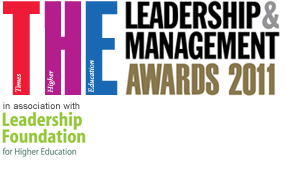 BU has been shortlisted for the Times Higher Education Leadership and Management Awards in the category of ‘Outstanding Research Management Team’.
BU has been shortlisted for the Times Higher Education Leadership and Management Awards in the category of ‘Outstanding Research Management Team’.
The submission focused on the set up and implementation of the CRE Operations team by FCS during 2009-10 and the benefits that a centralised service has provided.
BU has also been shortlisted in the category ‘Outstanding Finance Team’ (for the second year running).
The awards will take place on 16 June at the Grosvenor House Hotel, Park Lane, London.
This is a fabulous achievement for Financial and Commercial Services! 😀 Whoop!
For the list of finalists see the THELMAs website.
 The latest REF Highlight Report is now available from the Research Intranet.
The latest REF Highlight Report is now available from the Research Intranet.
Key points include updates on:
You can access the full document from here: REF Highlight Report #8
 Last week Research Councils UK (RCUK) published its new delivery plan. The plan sets out the programme of collective activities for the period 2011-2015, building on the strategic objectives set out in the RCUK Strategic Vision.
Last week Research Councils UK (RCUK) published its new delivery plan. The plan sets out the programme of collective activities for the period 2011-2015, building on the strategic objectives set out in the RCUK Strategic Vision.
The collective work that the Research Councils do as RCUK will cover two broad areas: delivering excellence with impact and enhancing efficiency.
The RCUK programme, detailed in the Delivery Plan, contributes to:
Collaboration and multidisciplinary research will continue to be supported through the six cross-Council themes:
Research Councils will also work collectively to both improve the efficiency of their own operations and drive enhanced efficiency in the wider research base.
For further information read the full RCUK Delivery Plan.
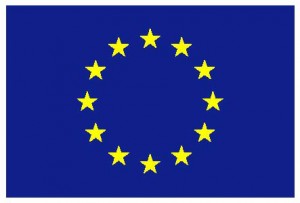 European Refugee Fund 2011
European Refugee Fund 2011
The UK Borders Agency has announced that it is seeking applications through the European Refugee Fund – which relates to resettlement under the Gateway Protection Programme. The minimum amount that can be applied for is £75,000 per year per project, and the maximum is £350,000 per year per project for up to three years to fund the management and delivery of activities. Deadline: 21.04.11
European Network of Mentors for Women Entrepreneurs
The EC has launched a new call for proposal to create a European network of mentors for women entrepreneurs. Grants of up to €75,000 will be available to each network. Deadline: 20.04.11
Support for European Cooperation in Education and Training – LLP
The EC has issued a call for proposals under its Lifelong Learning Programme to support European cooperation in education and training. Grants of up to €300,000 per project are available. Deadline: 30.06.11
Support for Television Broadcasting of European Audiovisual Works
MEDIA 2007 funding is available to cover up to 12,5% of an organisation’s eligible production budget (with a maximum amount per work of 500.000 €) for fiction and animation, and 20% of the organisation’s eligible budget (with a maximum of 300.000 € per work) for documentaries. Deadline: 20.06.11
This week good luck and congratulations are due to staff in the Business School, Media School and Applied Sciences. Julie Robson, Tim Ford, Sue Warnock and Mark Ridolfo all submitted enterprise bids for short courses or consultancy. Martin Kretschmer is to be congratulated on his successful application for support from AHRC/SCRIPT. In the Media School Sofronis Efstathiou and Hugh Chignell both submitted conference and enterprise bids, while Dan Jackson, Craig Batty and Jo Tyler have all received good news about bids. Finally in Applied Sciences congratulations are due to Eileen Wilkes and Bournemouth Archaeology for a couple of small grants and consultancy contracts.
Keep those bids coming!
Matthew Bennett